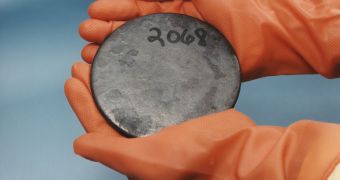Not long ago, the world was dreaming of clean electric energy generated with the nuclear power plants, but you can't have nuclear power plants without nuclear fuel, can you? We're in the 21st century and we're pumping more carbon dioxide into the atmosphere than ever, despite of all the international agreements signed over the years, stating that carbon dioxide emissions are to fall. As more and more carbon dioxide is released into the atmosphere, the more severe the global warming effects will be in the future.
Nuclear power can indeed resolve most of our problem, since only minute quantities of carbon dioxide are released during the nuclear fission reaction; all a nuclear power plant needs is enough water and fuel. Nevertheless, there are still some who oppose the use of nuclear energy, given its infamous link with nuclear weapons of mass destruction, nuclear power plant incidents such as Chernobyl, and of course the danger posed by radioactive nuclear waste.
Then, there is the problem of mining the actual fuel, uranium, which, unlike nuclear power plants, is not too environmentally friendly as previously believed. Basically, it's not like we don't have uranium on Earth, it's just in the wrong place at the wrong time, meaning deep underground. Additionally, environmental engineer from the Monash University, Gavin Mudd, says that these uranium deposits are also poor, which would involve both a lot of digging and refining just to bring it up to the standards.
Of course, all this mining are refining would require a large amount of energy and the use of industrial chemical, which immediately translates into more greenhouse gases.
"Over time, as ore grades decline and more energy is required for uranium production, this will lead to a higher carbon intensity for nuclear power, eventually becoming similar to gas-fired electricity, though this may be a few decades away and difficult to quantify precisely. Even is all coal-fired electricity was switched to nuclear magically, other sources would continue to contribute to climate change," said Mudd.
"I have often found that the numbers used by many in the industry, government or green groups are guesses rather extensive, measured data sets. The main thing is to understand the environmental costs of mineral production in terms of land disturbance, energy and water inputs, greenhouse outputs and that this will gradually climb up over time," he explained.
Uranium ore grades have been declining for over half of century, and this study is the best to point this out, said Thomas Graedel, industrial ecologist from Yale University. "These findings have implications for energy and water and carbon and all the other things tangled up with climate change. We likely should not count on nuclear power to solve our climate change problem, but it could be a component in a family of solutions we might decide to employ," said Graedel.

 14 DAY TRIAL //
14 DAY TRIAL //